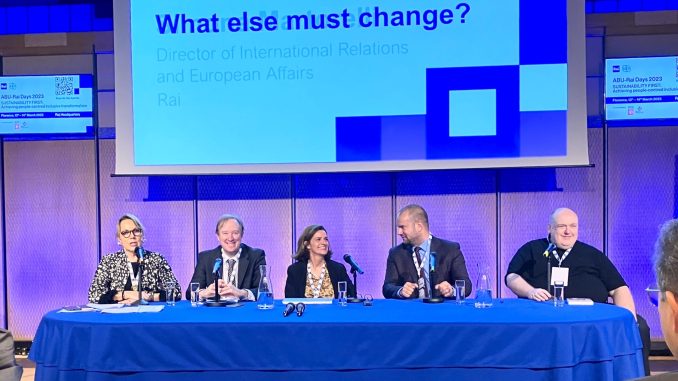
What else must change, was the question asked in the opening panel session on Day 2 of ABU-Rai Days.
Issues covered in the discussion included due diligence, changes in governance, operational risks, cultural alignment, as well as global and local competition.
Rai Sustainability ESG Deputy Director, Micol Rigo said sustainability “is a great opportunity to re-establish our role in society, in the areas of environmental, social and governance.”
“Organisations that do business with us have been urging us to be accountable for our sustainability.” The first pressures came in through finance compliance reporting requirements and now there more pressure for wider corporate sustainability reporting
“It is a challenge, but we need to drive the change and manage the uncertainty that will come with it.
“A company’s responsibility is to make a profit, but what is the idea of profit? Is it just money or does it also include long term decision making for the good of the planet? This is an opportunity for us to become leaders in the area of sustainability,” said Rigo.
EBU Director of Legal and Policy/General Counsel, Richard Burnley quoted Leonardo Da Vinci: “People of accomplishment don’t sit back and let things happen to them. They go out and made things happen.”
“We are trying to shape the regulations proactively within our PSM ethical framework, not letting things happen to us.
“Software companies are putting binding clauses in their customer contracts to ensure sustainability… companies are including clauses that ensure cooperation for sustainability without compromising competition laws.
Media companies first got on board with sustainability to improve their reputation, but now they are moving from a reputation based to a legal based motivation, where they will be able to show their legal and regulatory compliance.
“We need to monitor our progress to avoid Green Washing – making false claims or claims that you can’t substantiate.”
Quoting various academic studies, Università Svizzera Italiana Professor Matthew Hibberd urged broadcasters “to be more positive about what can be done about climate change in our coverage, show what people can do.”
He also made the point that the sustainability of broadcast companies needs to be addressed too, because broadcasters are losing out to the global world of big tech and to misinformation. “Public service broadcasters have tried to keep up, but in reality have lost ground to big commercial tech companies… PSBs are also now under pressure from disinformation channels.”
European News Alliance, Secretary General, Alexandru Giboi applied the sustainability lens to News. “We must secure the present without ruining the future,” he said.
“Our public is slowly fading away, so to ensure that we still have an audience in future, media need to adapt and find the right channels to attract the younger audiences.
“News agencies have already started to do so. We are adapting our newsgathering and our output so that audiences will remain interested in the news output we have to offer, but we are not losing the responsibility we have to report the news correctly.”
He pointed to a new trend where young audiences are searching directly for news on TikTok and Youtube, rather than through general search engines. Audiences now want content that they are interested in to find them, they don’t want to have to go searching for it.
“The old way was to go to a press conference and quote the person who spoke about the topic. Audiences no longer want to consume that type of news. The sustainable approach to news should address the whole value chain from when the story is gathered to when it reaches the audience. If we don’t connect our news to audiences, we will lose our relevance.”
Journalist training and media literacy are two other areas where more work needs to be done so ensure news sustainability. “Media literacy is important so that people understand the important role that good media can play in society.”
One of the legal issues facing broadcasters is the misappropriation of their signals, for example the illegal rebroadcasting of sport, according to ABU IP and Legal Committee Chair, Suranga Jayalath.
Sustainability was a theme running through all these topics, from environmental sustainability to the sustainability of media business models in the modern competitive environment.
